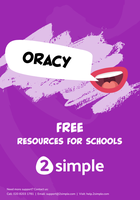Teaching Oracy in Primary Schools
June 17, 2025
What Oracy Is and Why It Matters
Oracy is the ability to express yourself clearly and fluently when speaking, being able to articulate ideas and opinions to other people, as well as having good listening skills. The English Speaking Union says that oracy skills boost a whole range of social, emotional and interpersonal skills, including self-confidence, self-awareness, resilience and empathy.
In 2023, The National Literacy Trust in the UK found that

"almost a third (31%) of five-year-olds started school without the language, communication and literacy skills they need to thrive - this statistic rises to almost half (47%) of children from disadvantaged communities"
Benefits of Teaching Oracy at an Early Age
Better Learning Outcomes
South African research shows that children entering Grade 1 with limited oral language skills are more likely to struggle with literacy throughout primary school.
According to the Department of Basic Education’s PIRLS (Progress in International Reading Literacy Study), 81% of South African Grade 4 learners cannot read for meaning. Strong oracy in the early years builds the foundation for reading comprehension and written expression.
Learners who can clearly express their thoughts, ask questions, and engage in discussion are more confident in tackling new learning across all subjects.
Better Employment Opportunities
In South Africa’s context of high youth unemployment, communication and presentation skills are often the difference between securing a job and being overlooked.
Employers frequently note that while young people may have formal qualifications, many lack workplace “soft skills” such as speaking confidently, engaging in meetings, or presenting ideas.
By nurturing oracy from an early age, schools can help close this skills gap and prepare learners for the demands of tertiary study and the workplace.
Better Mental Wellbeing
Poor communication skills can leave children feeling excluded, frustrated, or misunderstood – increasing the risk of low self-esteem and anxiety.
In South Africa’s diverse, multilingual classrooms, strong oracy also helps learners bridge cultural and language divides, giving them confidence to participate socially and academically.
Children who can express their emotions, needs, and experiences verbally are better able to self-regulate and build positive relationships with peers and teachers.
Interesting Reads:
PIRLS South Africa fact sheet:
Paper: Understanding Barriers to Youth Skills Development and Employment in South Africa (2016)
Free Oracy Resources for Primary Schools
How do teachers go about developing oracy in school? 2Simple have put together a free pack to help schools get started, with lots of practical activities and ideas.
Inside the pack, there are 5 different activities to try with your class, including:
- Recognising emotions
- Using specific words in conversation
- 'Would you rather...' discussion
- Debate about homework
- Persuasion activity
All activities come with an explanation and resources, including printable cards and worksheets.

Oracy Resources in Purple Mash
The free pack is just a selection of the Oracy resources available inside Purple Mash. With a Purple Mash subscription, teachers will have access to:
- Talking prompts:
Eight challenges to prompt discussion around classroom topics - Videos:
A video introducing oracy to learners, as well as three further videos which introduce Oracy Activities. They include
-How to interview somebody well
-Make a dull subject sound exciting
-Using a variety of words when speaking - Printable Oracy Activities:
Nine Oracy activities to use in the classroom with printable resources including word cards and worksheets. - Podcasting Ideas:
Use our new podcasting tool, 2Cast, in your classroom to develop oracy skills. You'll find lots of ideas on podcasting subjects a well as a guide to 2Cast.
Purple Mash subscribers can find all these resources inside the English area. Non-subscribers can get a free trial to explore all the tools and resources that Purple Mash has to offer.